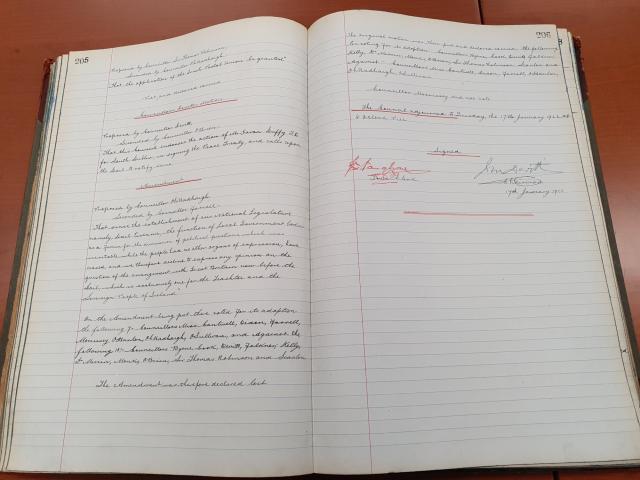dlr and the Anglo-Irish Treaty 1921
After the signing of the Treaty, three of the four Councils in the now Dún Laoghaire-Rathdown debated its content and sent resolutions reflecting their views by writing formally to Dáil Eireann. All of them saw the Treaty as a chance for peace and this is clearly recorded in the Minutes.
When the Anglo-Irish Treaty was signed on 6th December 1921, what is now Dún-Laoghaire-Rathdown was governed by 4 Urban District Councils (UDCs) – Blackrock, Dalkey, Killiney/Ballybrack and Dún Laoghaire, an arrangement which continued until 1930. Each of these Councils, represented the interests of their own constituents and had a vested interest in the ratification of the Treaty by Dáil Eireann, which is reflected in their Minute Books for the period.
To understand the depth of feeling concerning the Treaty, it is important to note that UDC records generally only reflect local issues. Frequently major events, such as the end of the First World War, are omitted from the record. It is therefore significant that three of the UDCs discussed the Treaty, reflecting its importance. Key also, is the fact most people believed that a vote in favour of the Treaty represented the only chance of averting war between Britain and Ireland. Indeed, the Irish plenipotentiaries also felt this and, knowing that the Irish forces were no match for the British, Lloyd George’s threat of war pushed the more reluctant to sign the final document.
The Treaty debate took place in the Dáil between 14th December 1921 and 7th January 1922, which gave interested parties an opportunity to express their opinion to the parliament. Except for Killiney/Ballybrack, the Dún Laoghaire-Rathdown councils availed of this.
Dalkey was first, at a Special Meeting held on 30th December 1921, at which they voted (nine in favour, one against):
That we, the members of the Dalkey Urban Council, desire to place on record our appreciation of the praiseworthy exertions of the Irish plenipotentiaries at the recent Peace Conference held in London. We are convinced that the Treaty secured for Ireland by the untiring energy and zeal of our envoys contains all the cherished elements of liberty and control of our national affairs that Ireland has fought for and bled for in the past. We therefore request our representatives to give expression of our opinions by voting for the ratification of the Treaty.
On 2nd January 1922, Blackrock followed suit:
That in order to advert the calamity that would probably result from a rejection of The Peace Terms now offered to this Country, we would urge most strongly on the members of Dáil Eireann the desirability of the ratification of The Treaty as agreed upon at the Conference in London. In so doing so we believe that we are representing the general opinion of the ratepayers of the district.
Finally, at their regular meeting on 3rd January, Dún Laoghaire agreed:
That this Council endorses the action of Mr. Gavan Duffy T.D. for South Dublin, in signing the Peace Treaty and calls upon the Dáil to ratify the same.
The debate in Dún Laoghaire was more contentious, but nevertheless the motion was carried by ten in favour, six against and one abstention.
This local feeling was reflected, on 7th January 1922, in the Dáil vote in favour of the ratification of the Treaty by the narrow margin of sixty-four to fifty-seven. Sadly, this is probably the most divisive vote in the history of the State leading to the split in the republican movement and to Civil War less than six months later.
News
View all
Have your Say for a Creative Day

St Patrick Brings Samba Spirit to Dún Laoghaire Parade Laun...





